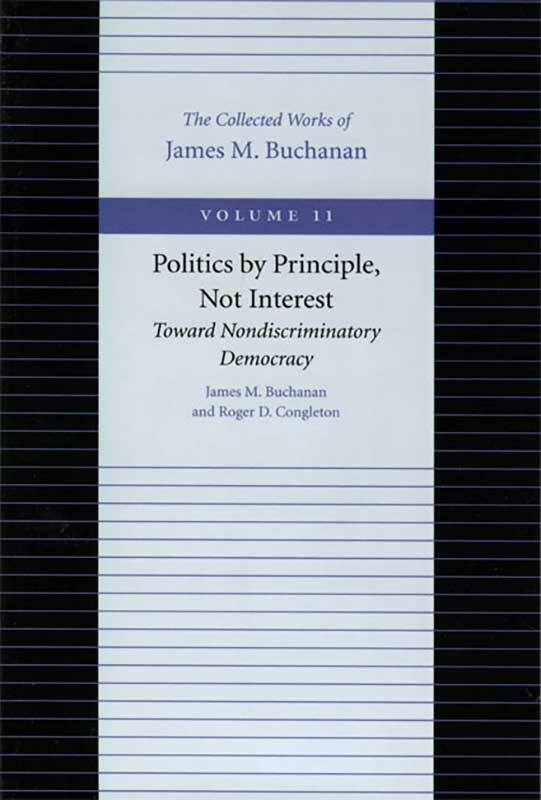Politics by Principle, Not Interest
Toward Nondiscriminatory Democracy
By James M. Buchanan and Roger D. Congleton
Foreword by Hartmut Kliemt
“Politics by principle is that which modern politics is not. What we observe is ‘politics by interest,’ whether in the form of explicitly discriminatory treatment (rewarding or punishing) of particular groupings of citizens or of some elitist-dirigiste classification of citizens into the deserving or non-deserving on the basis of a presumed superior wisdom about what is really ‘good’ for us all. The proper principle for politics is that of generalization of generality.”
—James M. Buchanan, from the Preface
In his foreword, Hartmut Kliemt sums up the main objective of James M. Buchanan and Roger Congleton’s Politics by Principle: “Imposing constitutional constraints on majoritarian politics such that a more principled pattern might emerge must be a political aim of high priority for all who wish for free and responsible citizens to live together peacefully as political equals under the rule of general laws. Buchanan and Congleton’s efforts to revive the classical liberal agenda in Politics by Principle, Not Interest are of the greatest interest in that regard. And this interest is not merely a theoretical one.”
As James Buchanan notes in introducing his co-author Roger Congleton, Politics by Principle, Not Interest “embodies the working out and presentation of a single idea . . . the extension and application of the generality principle to majoritarian politics.” After laying out the theory, Buchanan and Congleton attempt to work it out in practical political reality. Buchanan notes that “it is much easier to discuss the generality principle as an abstract ideal than it is to define the precise conditions for its satisfaction in any particular setting.” Not daunted by the difficulty of the task, the two authors succeed brilliantly in applying the generality principle to the political arena. They are interested not in laying down precise do’s and don’ts for politics, but in pointing out the ideal of nondiscriminatory governance and calling for constitutional constraints on political action so it conforms more closely to the generality norm.
James M. Buchanan (1919–2013) was an eminent economist who won the Alfred Nobel Memorial Prize in Economic Sciences in 1986 and was considered one of the greatest scholars of liberty in the twentieth century.
Details
Jun 2003 | 6 x 9 | 242 Pages
Volume 11
List of figures and tables, foreword, preface, index.
ISBNs
978-0-86597-233-9 Hardcover978-0-86597-234-6 Paperback

